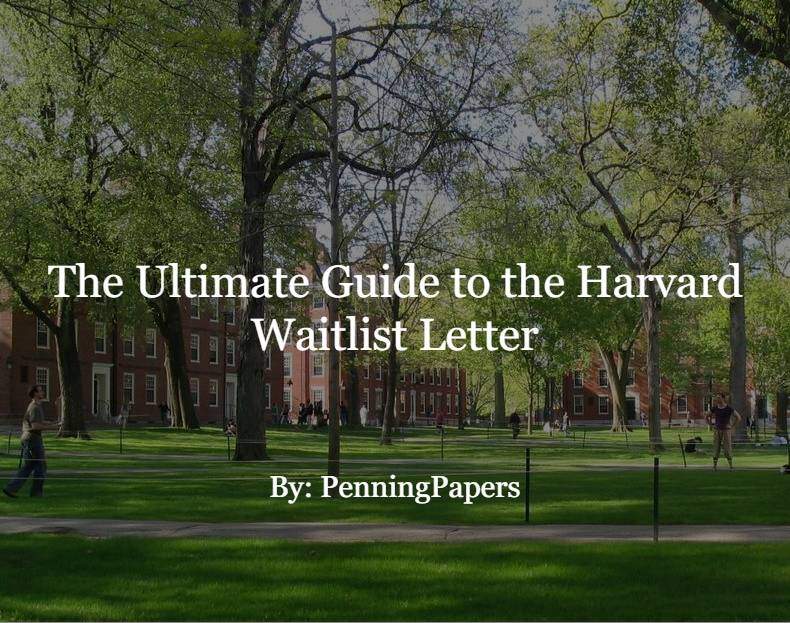If you’ve been waitlisted (or deferred) from Harvard, you may be disappointed, excited, anxious, and perhaps a cacophony of many other emotions in one pot.
Before we get to the guide, we want to let you know of a few important things to consider when writing your waitlist letter. Some people who are waitlisted by Harvard get confused by what the waitlist process entails. So, we’ve listed them below and answered them briefly.
- What Does Getting Waitlisted From Harvard Mean?
- It means you’re a smart cookie. It also means you didn’t reach the cutoff point for Harvard to truly accept you into their academic year. However, you weren’t incapable enough to be rejected. Harvard sees something in you that makes you deserving to be a qualified candidate for their school if they have the space.
- Does Getting Waitlisted From Harvard Mean That I Have No Chance of Getting Accepted?
- No, no, no, and no. Seriously. We get this question quite often here at PenningPapers, and we understand where this comes from. The overwhelming pessimism during college admissions can become quite addicting, especially because it absolves people of disappointment should they be rejected. However, don’t take on a defeatist attitude if you were waitlisted from Harvard. You have a chance of getting accepted from the waitlist so long as you demonstrate your skills properly in your waitlist letter. However, your waitlist letter and the contents in it need to be stronger than what other waitlisted applicants submit. We’ll show you how to do exactly that.
- Should I Get Another Letter of Rec?
- Yup! If you can, please consider requesting another letter of recommendation from a teacher who can vouch for your performance. Recommendation letters from other supervisors such as school counselors, club supervisors, personal mentors, and even Boy/Girl Scout leaders can provide you with additional letters of recommendation. Be sure that this is not only someone new but also someone who can provide extra information about you that may have not been considered in the previous application. You should also consider reading the letter of recommendation before having them submit it to ensure they are writing the proper content.
With that out of the way, let’s get to our ultimate guide on how to write the Harvard waitlist letter. There is a lot of content to cover in this guide, and for good reason. So, we highly recommend reading through the whole thing carefully before beginning your waitlist letter.
Table of Contents
- Setting Expectations: What Are My Chances of Getting Into Harvard From the Waitlist?
- Some Common Mistakes People Make When Writing the Harvard Waitlist Letter
- What to Write in the Harvard Waitlist Letter
Professional College Application Help.
Contact us. We'll get to you within 24 hours.
Setting Expectations: What Are My Chances of Getting Into Harvard From the Waitlist?

It’s important to have realistic expectations when submitting your waitlist letter for Harvard. It’s easy to look at the waitlist stats and feel defeated. However, it’s easy to be naively pessimistic about the matter as it is naively optimistic.
Here is what Harvard has to say about the Waitlist stats.
“Yes. Our wait list includes the applicants whom the Committee might still wish to consider for admission if spots in the entering class open later. The wait list is not ranked. In some years, we have admitted no one from the wait list; in others, we have admitted more than 200 candidates.”
Harvard Official Website
For the class of 2025, Harvard accepted a grand total of 0 applicants. Yikes.
However, some years yielded anywhere from the 30s to over 200 candidates. This is actually quite a large number considering Harvard. In fact, Harvard accepting anywhere between 0 to over 200 waitlisted students indicates that there is a large variance in what Harvard desires in their class. Perhaps they needed more of a particular student who would fit in their program; or, there was simply no space to accept any more students and they already had the perfect fits.
Either way, try not to take the waitlist as an attack on your personal academic performance. The waitlist indicates that you had the marks and the extracurricular background to get accepted. They just prioritized others and their unique qualities over yours.
With these stats in mind, the chances of getting off the Harvard waitlist can generally be assumed to be quite slim. Even if it happened to be the year when over 200 candidates get accepted, you should remember you are competing against other potentially Harvard-worthy students. So, even if you have strong marks and extracurricular activities, your chances will be slim.
Thus, it is critical that you know how to write the Harvard waitlist letter to stand out amongst the rest of the admissions pool. If you do not get this right, you can definitely guarantee your chances of acceptance will severely dip. Remember that other students will be trying very hard and have their own college admissions counselors help them as well. So, you’ll need to craft the right waitlist letter that can beat the competition. In the two sections below, we’ll show you how to do just that.
We’ll first cover common mistakes, then what to write in the Harvard waitlist letter.
Some Common Mistakes People Make When Writing the Harvard Waitlist Letter

Overprioritizing Grades
If you were waitlisted by Harvard, the chances that the deciding factor was your grades are very slim. In order to even be considered qualified as a potential Harvard candidate, students need to be in the top percentile in academic performance.
You have the opportunity to use the Harvard waitlist letter to demonstrate your skill and performance, but also to stand out amongst the rest of the application pool. Thus, do not overprioritize grades. Most applicants who were waitlisted by Harvard will already have the grades and test scores to demonstrate their skills as a result.
The parts you need to prioritize thus will be the factors that help distinguish you from the rest of the application pool. Think about the projects you’ve conducted since your application, the details you failed to mention, and the updates which you believe would paint an impression of you that compensates for potential weaknesses in the original application.
Not Having the Right Qualified Advisor and Editor
This is a big one.
Many of our clients came to us because they had advisors or editors who worked on their application essays and did a poor job. This isn’t the fault of any particular advisor or editor; here at PenningPapers, we don’t like to point fingers or bash qualifications.
The reality though is that the world of college admissions consulting and editing is filled with conjecture and misinformation. This can happen through private admissions consulting, or more commonly from school counselors.
Whether you attend high school or university, the likelihood the free counselors available at the college and career office at your institution will provide you 100% is slim. Most counselors in large institutions are busy, especially during admissions season. Period.
You can see this when searching for private admissions consultants as well. Many of them have a limited amount of help they can provide, and even then they’re juggling multiple applications and accounts at once.
Thus, it is important to have the right advisor and editor for your Harvard waitlist letter. Having someone who attended Harvard themselves could help, surely. Though, weirdly enough, we actually found the most important variable to having a good college admissions advisor is someone who can listen properly.
It sounds cliche, we know. But, at PenningPapers, we discovered this makes the biggest difference because everyone’s application has its own unique qualities. If you want to write a strong Harvard waitlist letter, you’ll need an advisor and editor who can listen to your story and deconstruct it to formulate the best path forward. This is crucial.
We recommend asking around for free short consultations. Try out 15 or 30-minute consultations with potential advisors and see if they can listen and understand your position to help guide you. They should NOT be just throwing advice at you. A proper Ivy League advising session would require the advisor to ask you questions, think critically about your position, and collaborate on your essay. It should NOT just be telling you what to do because they went to a great school themselves.
Receiving Conflicting Advice and Editing
This goes along with what we mentioned in the previous section about having the right advisor and editor.
It’s very common for the world of college admissions advising to be peppered with conflicting information. Some people will say only GPA matters. Others will be naively optimistic. Sometimes —actually, quite often— people will say there’s nothing you can do to increase your chances of acceptance because they’re trying to sell you their admissions service, e-book, etc.
Sometimes conflicting advice isn’t really the fault of advisors or counselors. Often times conflicting advice is a result of outdated information. Other times it’s a result of conjecture spread around by unqualified advisors.
For the most part, you can receive the most accurate technical details just by asking the school. Just give the school a call or send an email and they’ll give you information on transferring credits, academic details, etc.
If you’re looking for proper information on editing, it’s harder. But, a good rule of thumb is that strong advice is often not one-dimensional. That is, it considers all the qualities of the applicant’s background instead of falling under one particular set of rules. You know your editor is providing strong advice if they use admissions essay writing guidelines as a guide rather than hard rules; they also take it into consideration in conjunction with your unique circumstances —hence what we mentioned before about listening.
Being Too Braggy or Too Humble
This is a hard one to balance. Yet, it’s still important.
Applicants often have a hard time writing Ivy League waitlist letters with the right amount of confidence. They can struggle with being too braggy or too humble. The key to balancing humility with confidence is in the subtext of your writing. This demands a high level of verbal expertise.
One of the things we would recommend doing when trying to balance your writing and avoid being too braggy or humble is to write out your topics and updates in a list. When you imagine these items in your Harvard waitlist letter, imagine what impressions they may demonstrate about you and your personality.
So, for instance, let’s say you submitted your application and continued your next few months learning how to expand your AI-powered stock trading program.
You required the work of four other people to collaborate on increasing the profitability of the program. This collaboration should be written in a manner that prioritizes your ability to work together with other like-minded engineers as a leader. That means emphasizing the qualities that would parallel your future collaboration with other Harvard students and minimizing the details about how intelligent and fantastic you are.
What to Write in the Harvard Waitlist or Deferral Letter

Elaborate and Clarify the Activities in Your Application
This is the time for you to begin patching up the “mistakes” or “insufficiencies in your original application”. It’s also the best time for you to clarify extra details about your activities you feel were not sufficiently clarified in the original application.
If you took a few extracurriculars and conducted research projects in your field of interest, it may be time for you to elaborate further on some of the details of these events. You also want to tie the whole letter together by showing how these qualities make you a strong candidate for the school.
Okay, so let’s say that you originally started a program that would provide proper mental health services for those struggling with high-stress careers such as Law and Entrepreneurship. This may seem interesting in the original application, but you may want to clarify more about what this project entailed in the waitlist letter. Let’s say that you created downloadable pdfs and tutorial guides for mental wellbeing for those who typically fell in these categories and used research-led resources to ensure the guides properly help those in need.
This experience would demonstrate that you have both a creative vision for helping others in ways that other people may not originally see. You also demonstrate your ability to work in interdisciplinary fields such as Business, Law, and Psychology. This ability to think laterally and execute vertically shows you have the potential to manifest successful projects as a future student at Harvard.
Share New Updates
This one can be quite difficult.
Many applicants we speak to actually don’t have many updates to talk about on their Harvard waitlist. In fact, many people don’t have any updates to talk about at all after having submitted their applications. This is normal. Though, if you want to stand out amongst the rest of the waitlisted applicants at Harvard and write an impressive waitlist letter, it’s imperative to show admissions officers that you did not stay stagnant.
If you have new content to talk about, the same rules apply as the section prior: talk about what new info you have, elaborate on it to show a new side to you, and use that as leverage to prove you are a good fit for Harvard.
If you don’t have any updates to write about in the Harvard waitlist letter, we would highly recommend consulting with a professional college admissions advisor. Not having any updates to provide Harvard for your waitlist can be a rather strong disadvantage, especially considering the competition. So, you’ll need to weave your waitlist letter together with a fine needle and careful hand.
On one hand, you may want to not provide updates at all and completely ignore them. Simply elaborate on your previous extracurriculars and absolve the waitlist letter of updates since the application if you don’t have any.
On the other hand, you can use what time you have before the deadline to construct a project to work on so you have something to write about as an update. This is not always the best idea though, since doing this improperly can show admissions officers that you’re just trying to pad your application and game the system.
There’s no right or wrong answer that works as a blanket for everyone. Each applicant has unique circumstances that demand personal advice that suits their exact experience. What works for some does not for others. That’s why the careful guidance of an admissions advisor can go a long way. They can help you distinguish what’s the next best step if you don’t have any updates to write about (or if you just don’t know how to write about your updates).
If you have any further questions on how to write the Harvard waitlist letter, don’t be afraid to ask for help. The competition is fierce, and there are not many opportunities to make it to one of the greatest schools in the nation and world. Speak with a professional college admissions essay writing advisor and consultant. We can get back to you with a free 30-minute phone consultation to provide you with the best advice on how to best tackle your unique situations and provide you with tailored advice that suits your needs.

